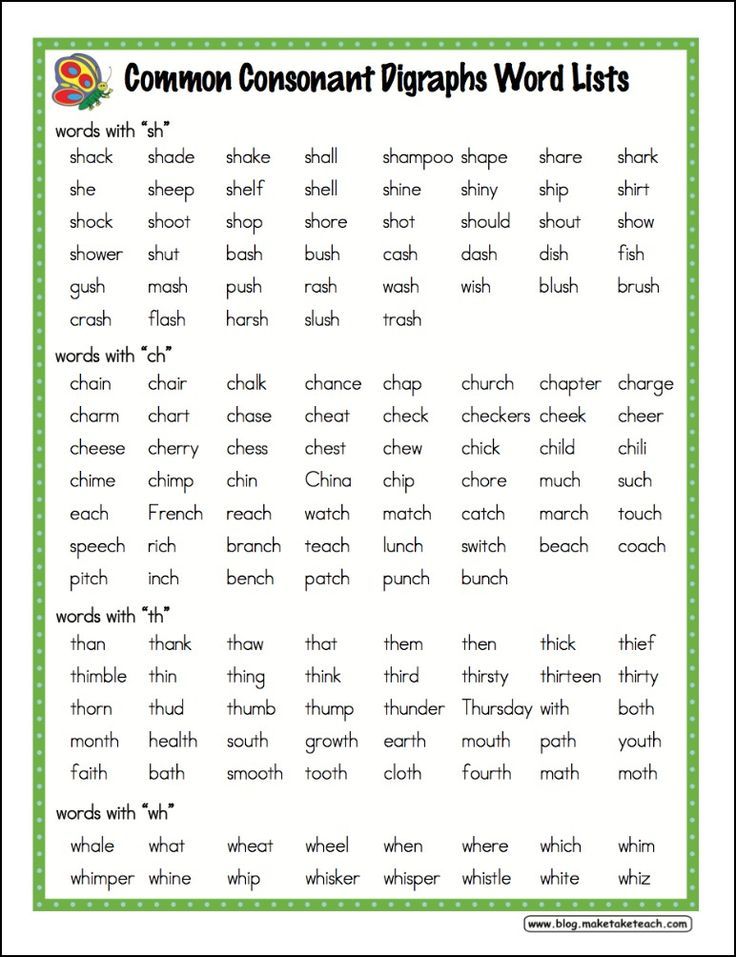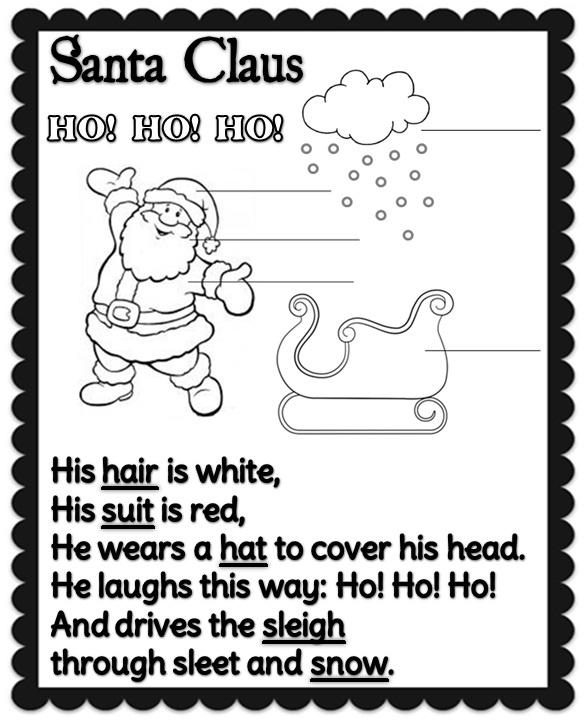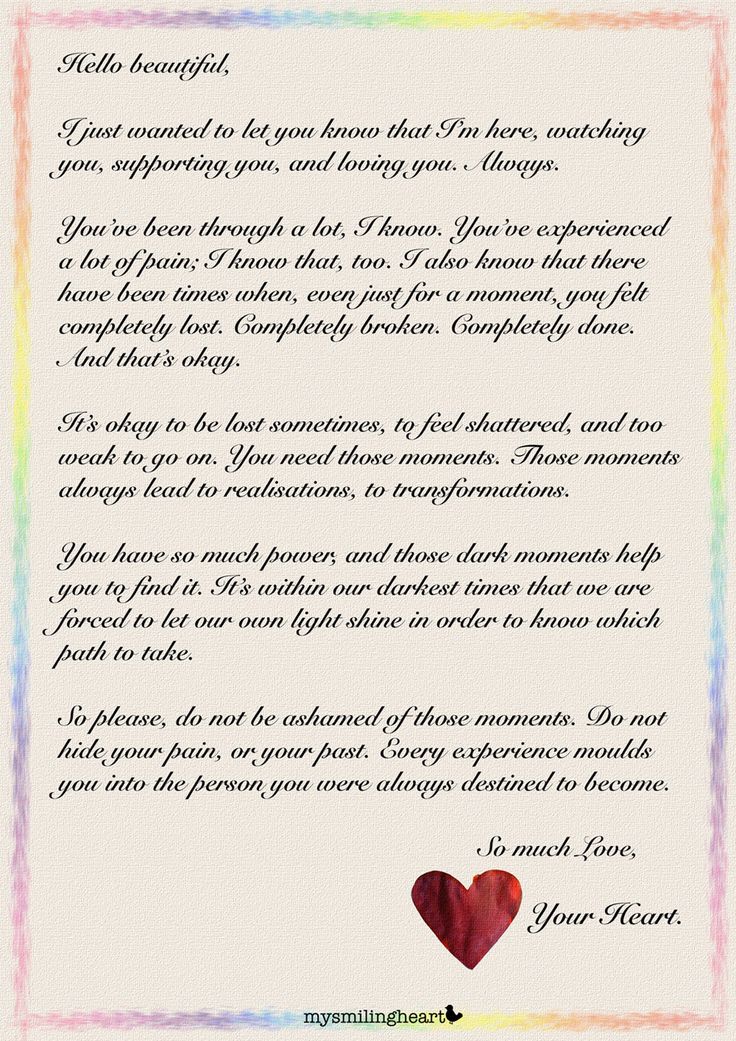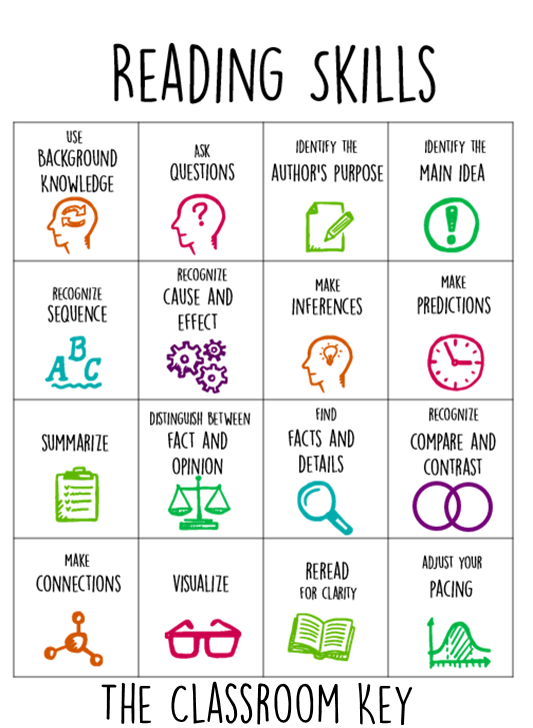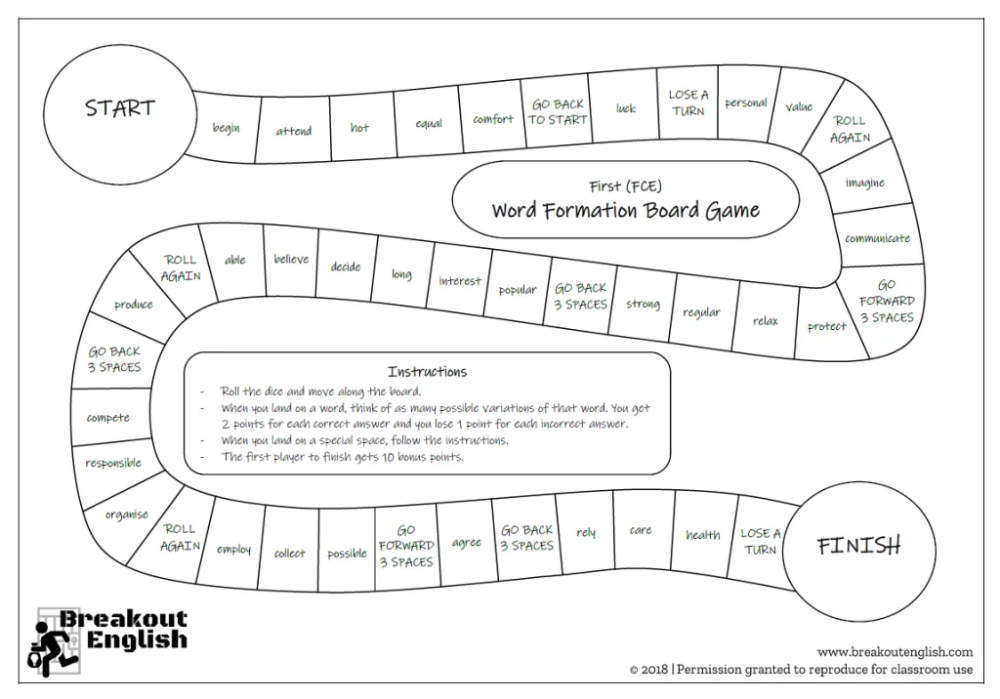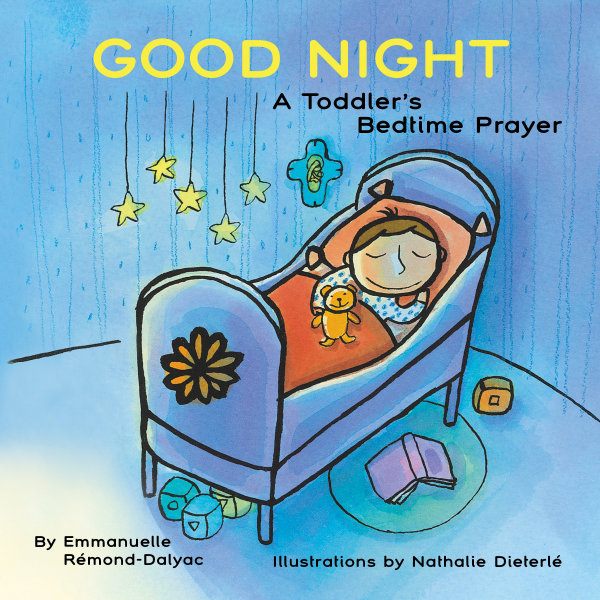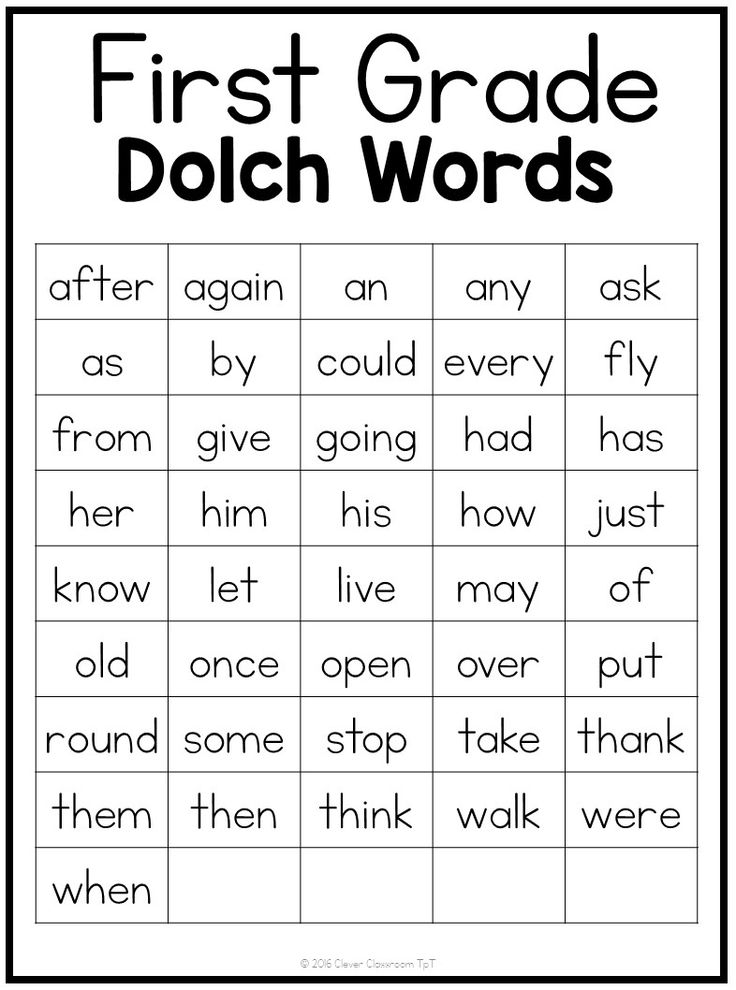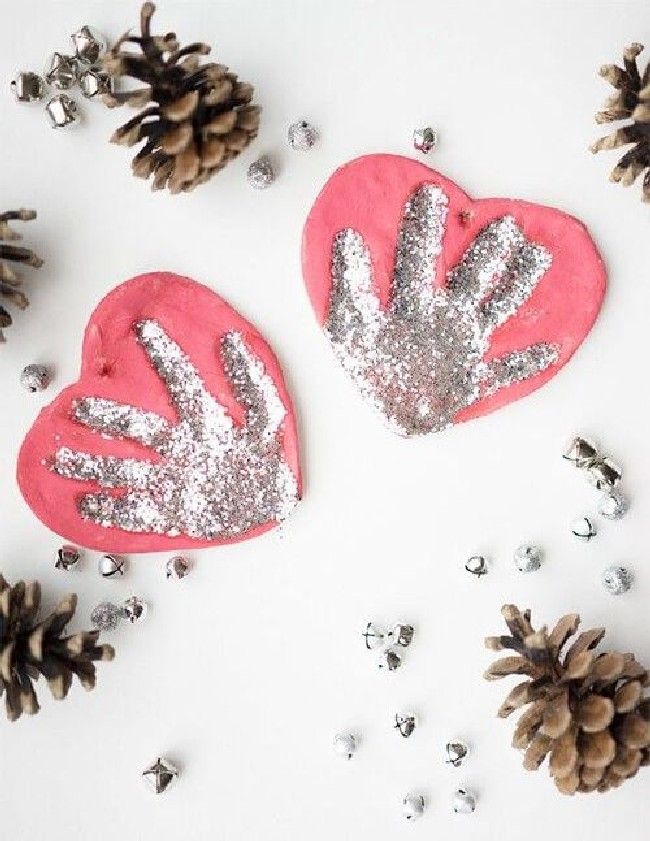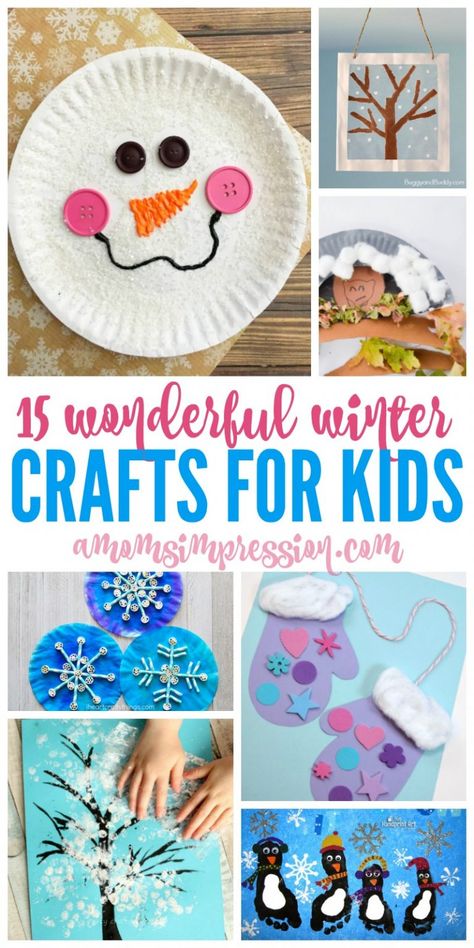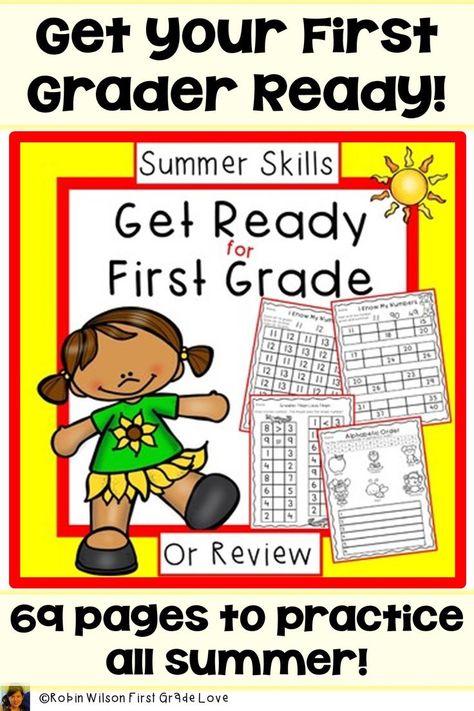List of compound words for kids
List of Compound Words for Kids in English With Examples
- What Are Compound Words?
- How Are Compound Words Formed?
- Types of Compound Words With Examples For Kids
- How To Identify Compound Words?
- List of Compound Words For Kids
- Simple Examples Of Compound Words For Kids
- Compound Word Sentences For Kids
- Easy Ways And Fun Activities To Teach Compound Words To Kids
Covering the basics of the English language from an early age is necessary to make kids proficient in English. Once kids form a strong foundation in the English language, they can easily excel in their academics, as all their subjects are taught in English. One important aspect of English is the type of words, especially compound words in English.
Knowing English well is necessary not only for studies but in daily life too. When kids use compound words to express themselves, they create a favourable impression on their teachers or peers. Using easy compound words shows their command of the English language. So, let’s learn compound words and how best to teach your child these words!
What Are Compound Words?
Before we start to teach kids compound words, let us first understand what is the meaning of compound words. Compound words are words formed by compounding or grouping two words. So, two English words are joined to form a new word: a compound word. The new compound word has an entirely new and individual meaning different from the two words it is made up of.
Source: https://i.pinimg.com/564x/f2/b8/21/f2b82157795f8b53a8169e64a520a22c.jpg
How Are Compound Words Formed?
Now that we know what compound words are, let’s learn how are they created or formed. As the English language changed with time, compound words were included to name new things.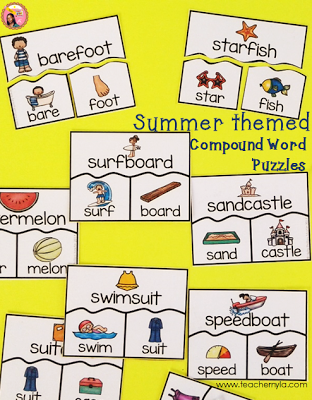 Sometimes when two words are often spoken or written in association, people start to use them together. Compound words were also created by making a new word from such closely associated words. However, through this process, compound words are first formed for speech and then later used in writing—for example, the compound word notebook. Note and book are often used in association. So it’s no wonder soon they are combined to create the word notebook. Sometimes, compound words are formed to bridge a gap in the English language, like the word football. It was developed using words- foot and ball, two things used to play the game.
Sometimes when two words are often spoken or written in association, people start to use them together. Compound words were also created by making a new word from such closely associated words. However, through this process, compound words are first formed for speech and then later used in writing—for example, the compound word notebook. Note and book are often used in association. So it’s no wonder soon they are combined to create the word notebook. Sometimes, compound words are formed to bridge a gap in the English language, like the word football. It was developed using words- foot and ball, two things used to play the game.
https://www.pexels.com/photo/blue-ceramic-plate-with-meal-plan-blocks-2377165/
Types of Compound Words With Examples For Kids
We now know what are compound words and how are they created. Now, it’s time to understand compound words and its types. An important fact is compound words don’t need to be made up of only two words. Sometimes, a compound word can be formed by using more than two words.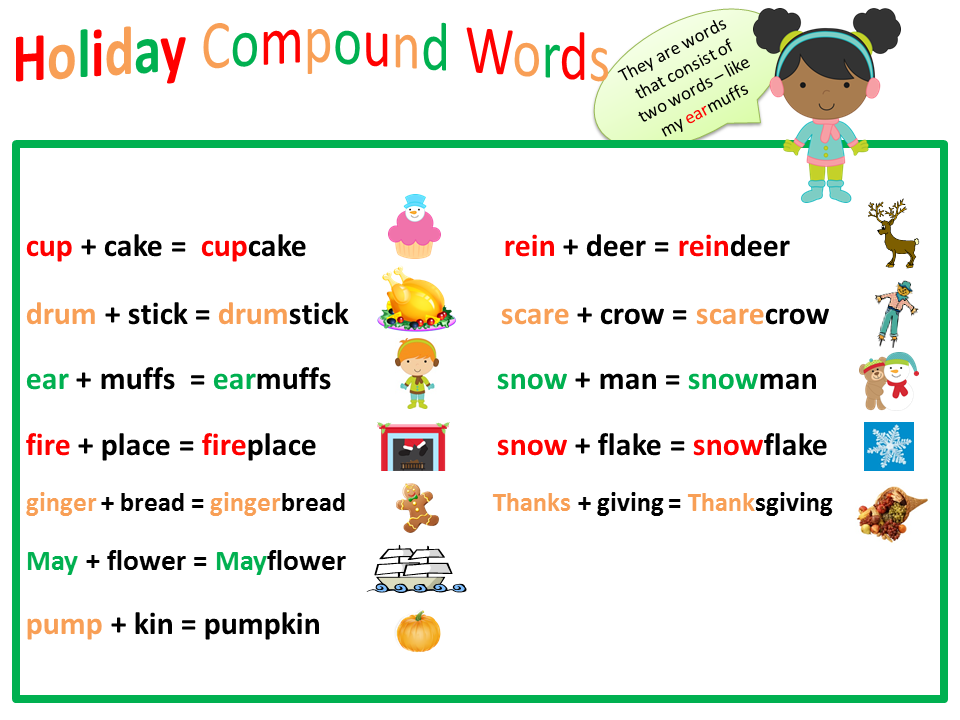
Let’s know the types of compound words with examples for kids:
1. Closed Compound words
These types of compound words are the most popular and recognised. They are formed by using smaller words to make a new large word without any space between the words. A few closed compound words examples are:
- Railroad
- Waistcoat
- Sunflower
- Mailbox
2. Open Compound Words
These compound words are written with a space in between the two words used to form them. Despite the space between the words, they are still considered as a single compound word. A few Open compound words examples are:
- Full moon
- Ice cream
- Living room
- Hot dog
3. Hyphenated Compound Words
These compound words are formed like open compound words. However, unlike the open compound words, they don’t have space in between the words but have a hyphen. A few hyphenated compound words examples are:
- Long-term
- Good-hearted
- Check-in
- Mother-in-law
How To Identify Compound Words?
The English language has many types of words.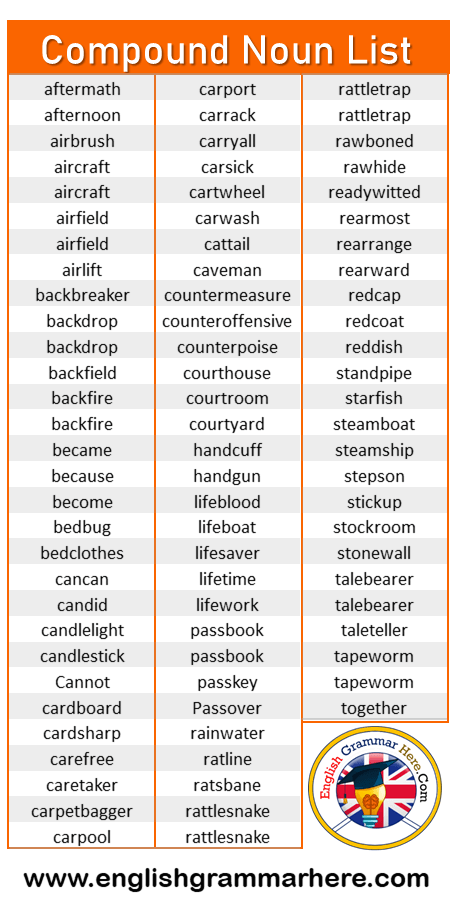 And sometimes, one can get confused between words, as many multi-syllable words may seem like compound words but are not. To identify compound words, you can break the word down, and if you are able to get individual or separate and meaningful words after breaking, then it’s a compound word; otherwise, not.
And sometimes, one can get confused between words, as many multi-syllable words may seem like compound words but are not. To identify compound words, you can break the word down, and if you are able to get individual or separate and meaningful words after breaking, then it’s a compound word; otherwise, not.
List of Compound Words For Kids
Compound words for class 1, 2 and 3 kids can be a bit tough to understand and learn. Here is a list of compound words for kids:
| Paycheck | Firework | Tablespoon |
| Newspaper | Movie Theatre | Superstar |
| Catfish | Sailboat | Dress Shoes |
| Bodyguard | Waistcoat | Lighthouse |
| Runway | Caveman | Starfish |
| Lifetime | Toothbrush | Moon Rocks |
| Uplift | Railroad | Needle Work |
| Strawberry | Nobody | Hopscotch |
| Crosswalk | Goldfish | Sunburn |
| Groundhog | Fisherman | Outer Space |
| Handshake | Desktop | Timekeeper |
| Keyboard | Rollout | Uptown |
| Spearmint | Dropdown | Candlestick |
| Rainbow | Video Game | Waterproof |
| Angelfish | Tupperware | Dustbin |
| Birdhouse | Kickball | Doorbell |
| Keyhole | Firefighter | Eyeball |
| Cupcake | Ponytail | Dragonfly |
| Gingerbread | Moonwalk | Skateboard |
| Itself | Spaceship | Underground |
| Airplane | Schoolwork | Needlepoint |
| Blueberry | Work Boots | Over-The-Counter |
| Upperclassman | Superman | Peppermint |
| Fishhook | Tadpole | Snowball |
| Tugboat | Popcorn | Daydream |
| Herself | Hardship | Grasshopper |
| Billboard | Downhill | Horseman |
| Doghouse | Raincoat | Throwback |
| Armpit | Snowflake | Mother-In-Law |
| Wallflower | Bookstore | Laptop |
| Underestimate | Midnight | High Heels |
| Goodnight | Armchair | Car Wash |
| Downstairs | Baseball | Tailgate |
| Timeshare | Nightlight | Beachball |
| Mindset | Teacup | Taxpayer |
| Database | Extracurricular | Fingernail |
| Airport | Hometown | Downpour |
| New-born | Father-In-Law | Worksheet |
| Stingray | Water boy | Starlight |
| Neighbourhood | Necktie | Solar System |
| Neckline | Raindrop | Bow Tie |
| Handout | Bathtub | Snowhite |
| Underwater | Rock band | Blackhole |
| Takedown | Drugstore | Firefly |
| Backpack | Key point | Brainstorm |
| Teaspoon | Hamburger | French Fries |
| Firecracker | Mailman | Needlework |
| Shoelace | Racquetball | Horseplay |
| Milkshake | Handbag | Football |
| Farewell | Earthworm | Earlobe |
| Grandchild | Tailbone | Busboy |
| Overestimate | Textbook | Show-off |
| Kickboxing | Softball | Teammate |
| Chocolate Chip | Newsletter | Boardwalk |
| Network | Ant farm | Watermelon |
| Dead-end | Rawhide | Hairband |
| Cabdriver | Ballpark | Moonlight |
| Honeydew | Postcard | Rocket ship |
| Pathway | Bike Rack | Sunroof |
| Redhead | Headband | Subway |
| Rattlesnake | Hotdog | Supercharge |
| Earthquake | Notebook | Cartwheel |
| Rowboat | Crossbow | Handcuff |
| Takeout | Fishbowl | Sunglasses |
| Redwood | Without | Homemade |
| Sunflower | Drawbridge | Jellybean |
| Peanut | Soundproof | Butterfly |
| Wheelchair | Namesake | Tennis Shoes |
| Footstep | Chalkboard | Policeman |
| Worldwide | Schoolbooks | Mailbox |
| Forearm | Daytime | Understand |
| Nosebleed | Grandparents | Ice Cream |
| Staircase | Somewhere | Thunderstorm |
| Scarecrow | Passport | Eyebrow |
Simple Examples Of Compound Words For Kids
We understand that a compound word is formed by joining two or more words.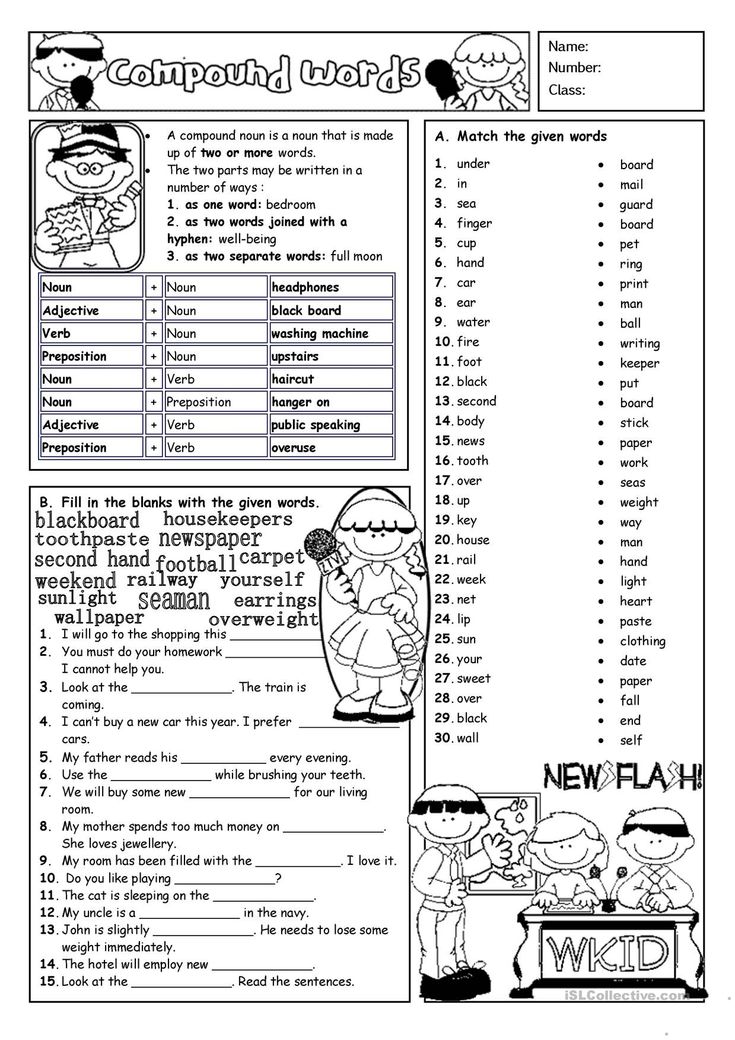 To identify a compound word, we can split it into separate meaningful words. Compound words can be formed by combining nouns with nouns, adjectives with nouns, or nouns with adverbs, prepositions, and verbs. To understand this, let’s see some simple examples of compound words for kids.
To identify a compound word, we can split it into separate meaningful words. Compound words can be formed by combining nouns with nouns, adjectives with nouns, or nouns with adverbs, prepositions, and verbs. To understand this, let’s see some simple examples of compound words for kids.
1. Noun-Noun Compound Words
Examples of compound nouns are:
- Sun, Flower = Sunflower
- Cup, Cake = Cupcake
- Rain, Bow = Rainbow
- Snow, Man = Snowman
2. Adjective-Noun Compound Words
Examples of adjectives with Noun compound words are:
- Black, Board = Blackboard
- Full, Moon = Fullmoon
- Green, House = Greenhouse
- Sweet, Heart = Sweetheart
- Common, Room = Common room
3. Noun-Adjective Compound Words
Examples of Nouns with adjectives compound words are:
- Sugar, Free = Sugar-Free
- Lap, Top = Laptop
- Heart, Broken = Heartbroken
- Life, Long = Lifelong
- Home, Sick Homesick
4.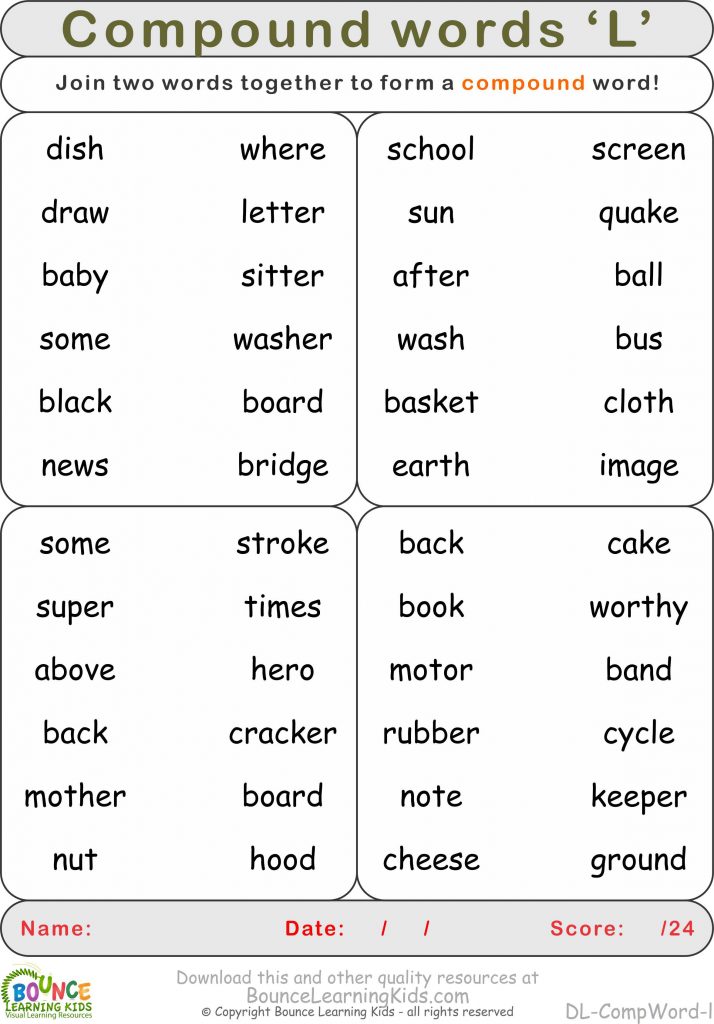 Verb-Noun Compound Words
Verb-Noun Compound Words
Examples of Verbs with Noun Compound words are:
- Living, Room = Living Room
- Swimming, Pool Swimming Pool
- Driving, License = Driving License
- Bath, Room = Bathroom
- Note, Book = Notebook
Compound Word Sentences For Kids
Some compound word sentences for kids are:
- Michael, did you go to the bathroom?
- This is the first snowfall of the season.
- Why do you have a bodyguard?
- I am going to the bookstore.
- Rohit is practising cartwheels in the playground.
Easy Ways And Fun Activities To Teach Compound Words To Kids
Here are some easy ways and fun activities to teach compound words to kids:
1. Flashcards
Kids learn best with visual aids such as flashcards. You can teach them good compound words through flashcards of different words and pictures. Then test their compounding examples knowledge through flashcard games.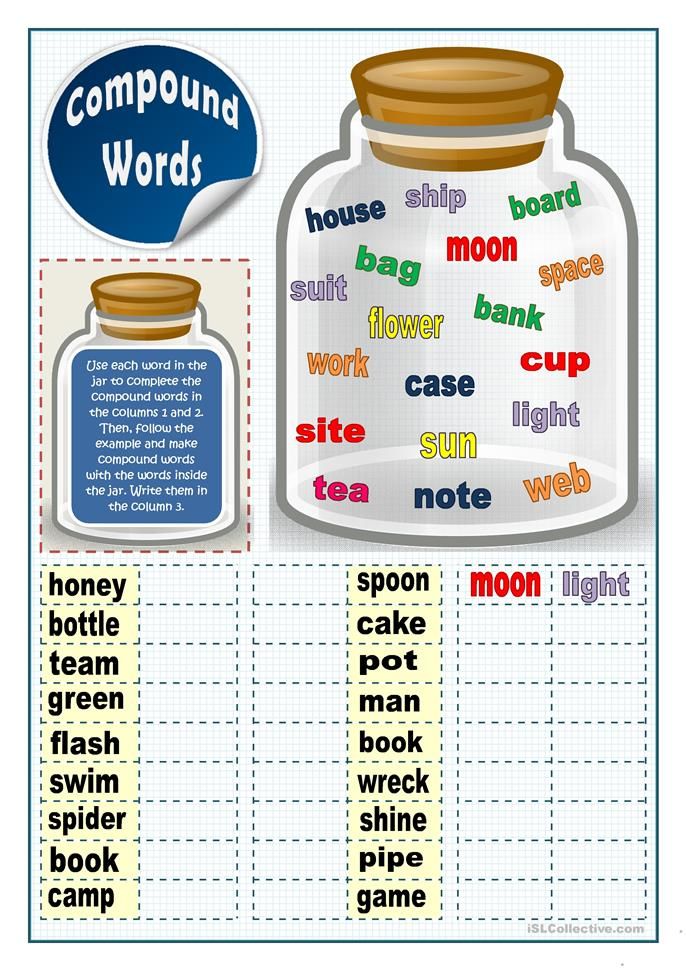
What You Need
- Flashcards with words
- Flashcards with pictures
Instructions
- Keep the flashcards with words face down.
- Keep the flashcards with pictures facing up.
- Ask the kids to flip a word flashcard one at a time and match it with a picture flashcard to form a compound word. For example – the word Blue with the picture of Berries will make the word blueberries.
- The kid who makes maximum compound words wins.
2. Match the cards
In this easy compound words activity, you can ask the kids to make the simple word cards and then choose the cards to make compound words.
What You Need
- Index cards /paper slips
- Markers
Instructions
- First, ask the kids to write simple words on the index cards or paper slips. You can help them with the word selection.
- Ask them to keep all the cards face down.
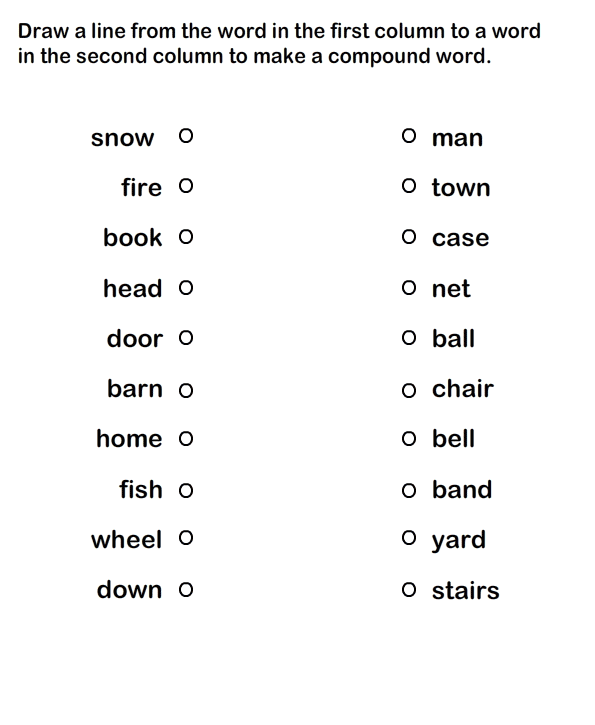
- At one time, a kid can flip two cards and make compound words.
- The kids will need to remember the cards to form words.
- The kid who makes maximum compound words wins the game.
3. Draw and guess
All kids will love this hands-on activity.
What You Need
- A black or whiteboard
- Markers or chalks
- List of compound words
Instructions
- Divide the kids into two teams.
- Give a compound word to one team.
- One kid from that team will draw the pictures of the word for the other team to guess. For example – you give the word treehouse so that the kid will draw a tree and a house.
- The other team must guess the compound word from the pictures.
- The team that guesses the maximum correct compound words wins.
4. Guess the word
Modify the classic dumb charades into a compound words game.
What You Need
- List of compound words
Instructions
- Divide the kids into two teams.
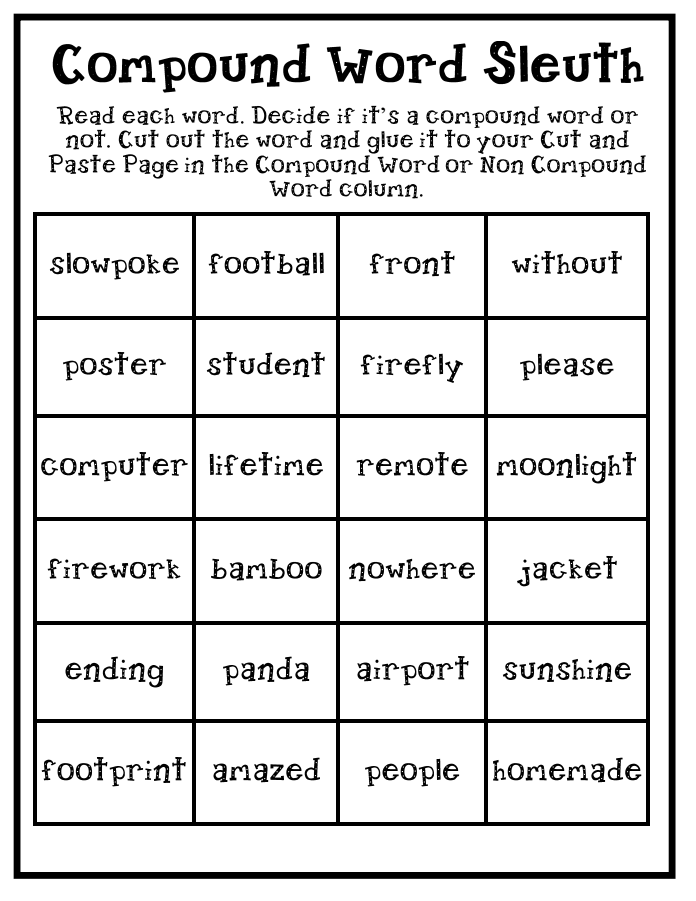
- Give a compound word to one kid from a team.
- The Kid will act out the compound word by breaking it into separate words. For example – you give the word snowman. Now the kid will act out snow and man separately for its team to guess.
- The team that guesses the maximum words wins.
5. Compound word creation
Compound words for kindergarten kids can be a bit tricky to learn. This activity is ideal for young kids.
What You Need
- Index cards
- Markers
- List of compound words
Instructions
- Separate the compound words into smaller words.
- Help your child write each small word on an Index card.
- Now, make your kid match the cards to make a compound word and read it aloud with them.
- This will help them to memorise and learn the words.
When teaching compound words, remember that all kids have different learning styles and paces.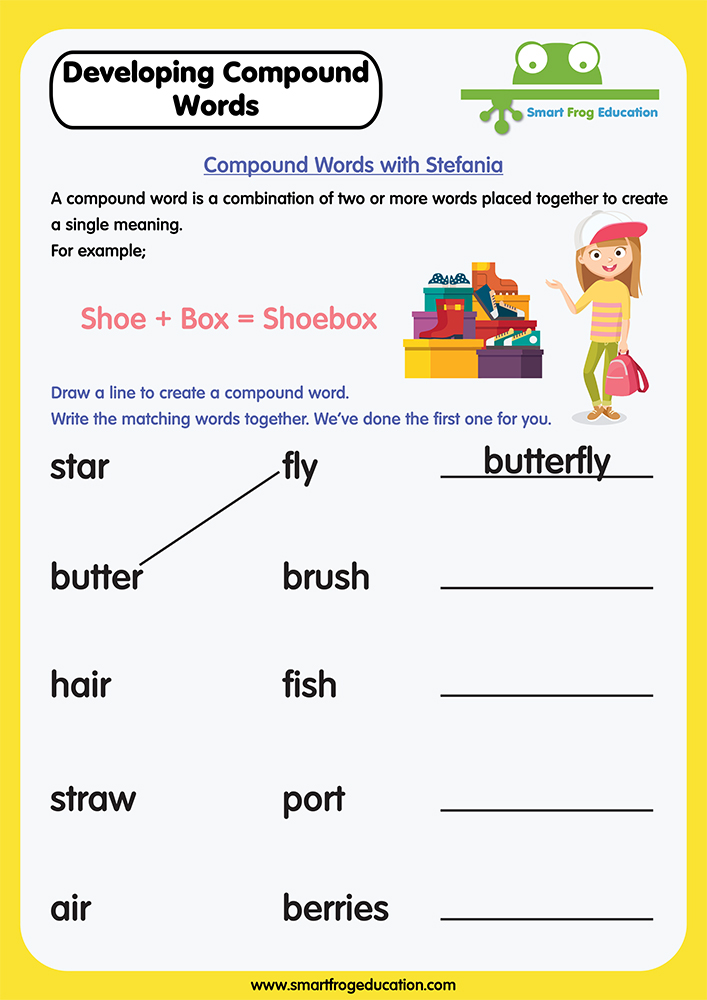 Some kids can understand compound words quickly, and for some kids, it takes a bit of time. Engage them in fun activities and games to help them fully understand and learn compound words.
Some kids can understand compound words quickly, and for some kids, it takes a bit of time. Engage them in fun activities and games to help them fully understand and learn compound words.
150+ Examples Of Compound Words For Kids
Compound words for kids are designed by combining two simpler words to form one complex word. An example of this would be mail + box = mailbox. We often use compound words without realizing they consist of two different, simpler words.
What are compound words?
When asking, “what are compound words?” we need to look at the utility of compound words in modern language. They describe complex ideas or objects that can be represented by combining two simpler words. For example, the words seashell and seashore are compound words that have derivatives in sea, shell, and shore.
We use compound words to make sense of new phrases, objects, phenomena, and events. They are highly flexible by design and can be used to describe a large number of things.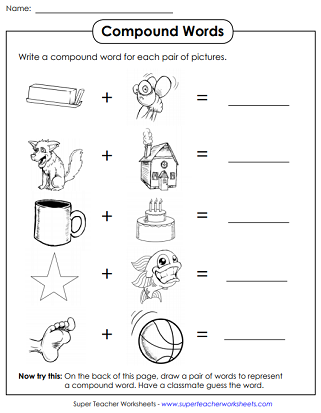
You can teach your students to use compound words through a compound words list for kids and compound words examples to get them to learn the construct effectively.
Let’s check out different types of compound words and some examples you can teach your students to help them understand compound words better for optimal reading. You can also use these examples of compound words to make stories and quiz your students in larger texts.
SplashLearn inspires lifelong curiosity with its game-based PreK-5 learning program loved by over 40 million children. With over 4,000 fun games and activities, it’s the perfect balance of learning and play for your little one.
Try for free
What are the types of compound words for kids?
Now that we have explored a comprehensive list of compound words for kids, let us understand what are the types of compound words that students should know and understand. You can focus on the utility of compound words to help students learn them better.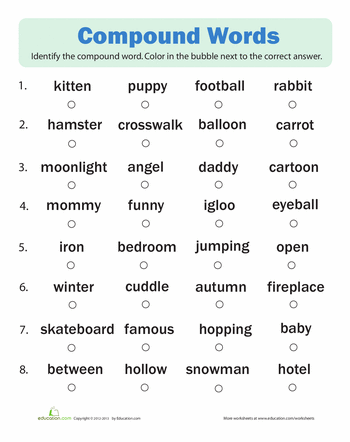
1. Closed compound words
This is a classic example of compound words, wherein two words come together to form a completely new type of word. An example of this would be, moon + light = moonlight or base + ball = baseball. You can focus on how these words are used extensively across literary works across reading levels.
2. Open compound words
When a modifying adjective is added to a noun to create a new noun, that is an open compound word. An example of this would be store + room = storeroom. You can focus on how open compound words are used when writing sentences and describing objects.
3. Hyphenated compound wordsWords like father-in-law or well-known are hyphenated compound words as they are formed with a hyphen combining two words. They retain some of their original contextual meaning through hyphenation, giving readers clarity about their meaning.
By understanding the different types of compound words, you can teach your students to be better readers and writers in the English language.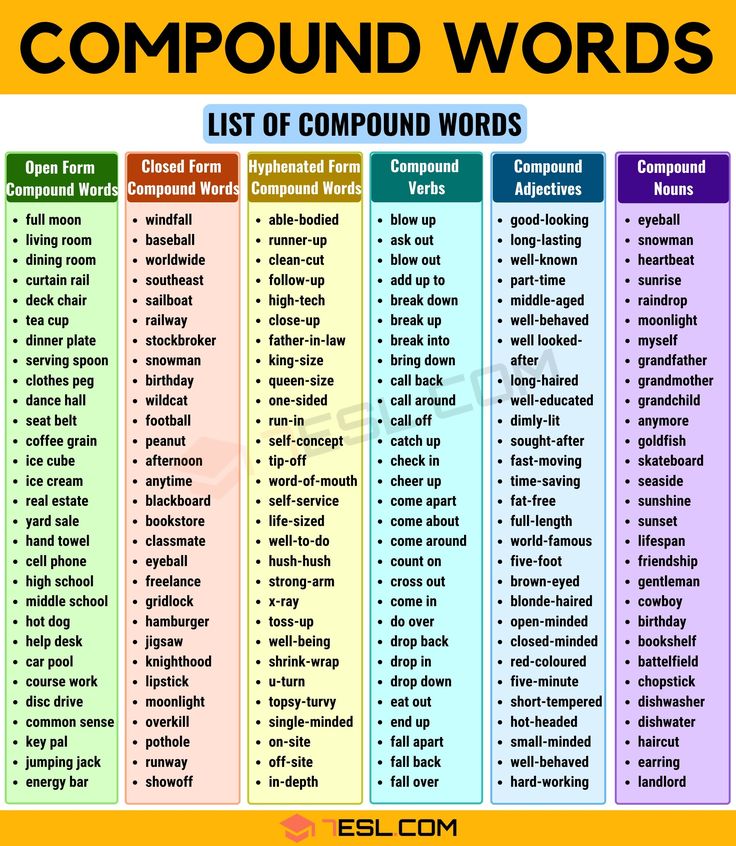 You can also focus on innovative teaching methods to better explain compound words to students. You can leverage unique strategies to make compound words intuitive for kids of all ages.
You can also focus on innovative teaching methods to better explain compound words to students. You can leverage unique strategies to make compound words intuitive for kids of all ages.
Let’s look at 150 examples of compound words for kids
Compound words come in all variations, making them an important topic to focus on as kids progress from grade to grade. You can use these 150 examples of compound words to teach kids about the subject area within your own lesson plan.
After + Noon = Afternoon
Air + Plane = Airplane
Air + Port = Airport
Angel + Fish = Angelfish
Any + Body = Anybody
Any + One = Anyone
Arm + Chair = Armchair
Arm + Pit = Armpit
Basket + Ball = Basketball
Bath + Tub = Bathtub
Bed + Room = Bedroom
Birth + Place = Birthplace
Blue + Berry = Blueberry
Body + Guard = Bodyguard
Book + Store = Bookstore
Brain + Storm = Brainstorm
Bull + Frog = Bullfrog
Bus + Boy = Busboy
Butter + Fly = Butterfly
Cab + Driver = Cabdriver
Can + Not = Cannot
Candle + Stick = Candlestick
Cat + Fish = Catfish
Cave + Man = Caveman
Cross + Bow = Crossbow
Cross + Walk = Crosswalk
Day + Break = Daybreak
Day + Dream = Daydream
Day + Light = Daylight
Desk + Top = Desktop
Dog + House = Doghouse
Door + Bell = Doorbell
Door + Mat = Doormat
Down + Hill = Downhill
Dragon + Fly = Dragonfly
Drop + Down = Dropdown
Dust + Bin = Dustbin
Every + Thing = Everything
Extra + Curricular = Extracurricular
Eye + Ball = Eyeball
Eye + Brow = Eyebrow
Finger + Nail = Fingernail
Fire + Cracker = Firecracker
Fish + Bowl = Fishbowl
Fisher + Man = Fisherman
Foot + Ball = Football
Foot + Path = Footpath
Foot + Step = Footstep
Gold + Fish = Goldfish
Good + Night = Goodnight
Grand + Father = Grandfather
Grass + Hopper = Grasshopper
Ground + Hog = Groundhog
Hard + Ship = Hardship
Head + Band = Headband
Home + Town = Hometown
Honey + Dew = Honeydew
Hop + Scotch = Hopscotch
Horse + Play = Horseplay
Hot + Dog = Hotdog
In + Side = Inside
It + Self = Itself
Key + Board = Keyboard
Lay + Out = Layout
Lay + Over = Layover
Life + Time = Lifetime
Light + House = Lighthouse
Lip + Stick = Lipstick
Mail + Box = Mailbox
Merry + Go + Round = Merry-Go-Round
Mid + Night = Midnight
Milk + Shake = Milkshake
Mind + Set = Mindset
Moon + Light = Moonlight
Mother + In + Law = Mother-In-Law
Mother + Land = Motherland
Name + Sake = Namesake
Neck + Tie = Necktie
Needle + Point = Needlepoint
New + Born = Newborn
News + Letter = Newsletter
News + Paper = Newspaper
Ninety + Nine = Ninety-Nine
No + Body = Nobody
Nose + Bleed = Nosebleed
Note + Book = Notebook
Note + Worthy = Noteworthy
Out + Side = Outside
Over + Estimate = Overestimate
Pepper + Mint = Peppermint
Pillow + Case = Pillowcase
Pony + Tail = Ponytail
Pop + Corn = Popcorn
Race + Horse = Racehorse
Rail + Road = Railroad
Rain + Bow = Rainbow
Rain + Coat = Raincoat
Rain + Storm = Rainstorm
Rain + Drop = Raindrop
Row + Boat = Rowboat
Run + Way = Runway
Safe + Guard = Safeguard
Safe + House = Safehouse
Salt + Water = Saltwater
Scare + Crow = Scarecrow
School + House = Schoolhouse
Short + Term = Short-Term
Show + Lace = Shoelace
Skate + Board = Skateboard
Smart + Phone = Smartphone
Snow + Storm = Snowstorm
Soft + Ball = Softball
Some + Where = Somewhere
Sound + Proof = Soundproof
Space + Ship = Spaceship
Spear + Mint = Spearmint
Stair + Case = Staircase
Star + Fish = Starfish
Star + Light = Starlight
Sting + Ray = Stingray
Straw + Berry = Strawberry
Sub + Way = Subway
Sun + Burn = Sunburn
Sun + Flower = Sunflower
Sun + Glasses = Sunglasses
Sun + Ray = Sunray
Sun + Roof = Sunroof
Sun + Shine = Sunshine
Super + Man = Superman
Super + Star = Superstar
Table + Spoon = Tablespoon
Tad + Pole = Tadpole
Tail + Bone = Tailbone
Take + Out = Takeout
Tea + Cup = Teacup
Tea + Spoon = Teaspoon
Text + Book = Textbook
Throw + Back = Throwback
Thunder + Storm = Thunderstorm
Tooth + Brush = Toothbrush
Tooth + Paste = Toothpaste
Tug + Boat = Tugboat
Tupper + Ware = Tupperware
Two + Fold = Two-fold
Under + Ground = Underground
Up + Stream = Upstream
Upper + Class + Man = Upperclassman
Waste + Basket = Wastebasket
Water + Body = Waterbody
Water + Melon = Watermelon
Water + Proof = Waterproof
Wheel + Chair = Wheelchair
With + Out = Without
Work + Boats = Workboats
Work + Sheet = Worksheet
You can also take advantage of the online games available through SplashLearn to teach through gamified learning.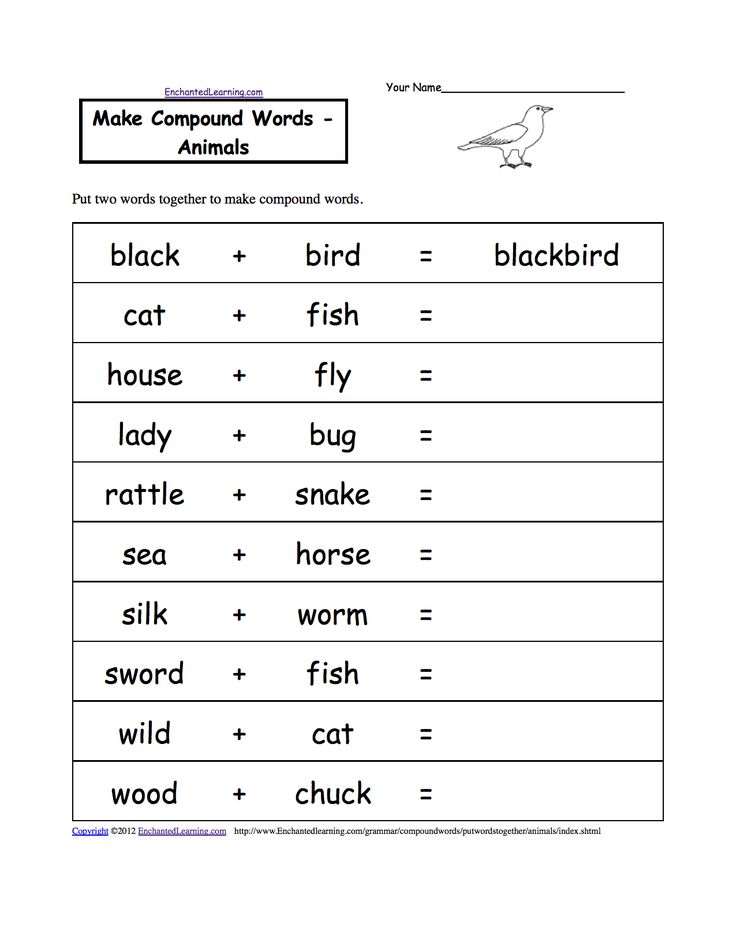
Check out our extensive library of amazing reading games you can play with your students!
Exploring fun ways of teaching compound words to kids
Teachers should look for two essential elements when explaining compound words to students; you should remember to explain that compound words can have new meanings when connecting two smaller words.
You should also clarify that complex words can be three words coming together to form a new word. Compound words can be multi-syllable, but not all multi-syllable words are compound words. This should help kids understand what they are without feeling confused.
Compound words for kids can be complicated to pick up through verbal instructions alone. You can focus on games, puzzles, toys, and exercises to get kids to understand the utility and versatility of compound words.
1. Identifying compound words in storiesBy reading through books and short stories, your students may already be familiar with, you can ask kids to identify compound words within the text.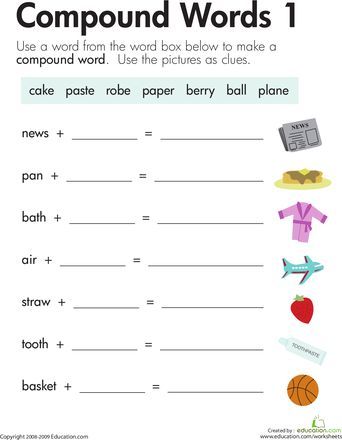 This will help them understand why we use compound words in English and how they impact contextualization and structuring.
This will help them understand why we use compound words in English and how they impact contextualization and structuring.
You can make poems and songs on compound words and use songs to help kids enjoy learning about compound words naturally. You can also bring props to demonstrate which words are compound words and which aren’t.
3. Chopping wordsYou can print out compound words on paper in a nice bold font and have your students cut in the middle of the compound word to create two words. If your students understand compound words correctly, they should be able to cut the compound word’s original root words.
4. Determining Which is Compound & Non-CompoundYou can play a game with your students to help them understand compound words better. By giving them two options and asking them to figure out whether they are compound words or not, you can test their abilities organically.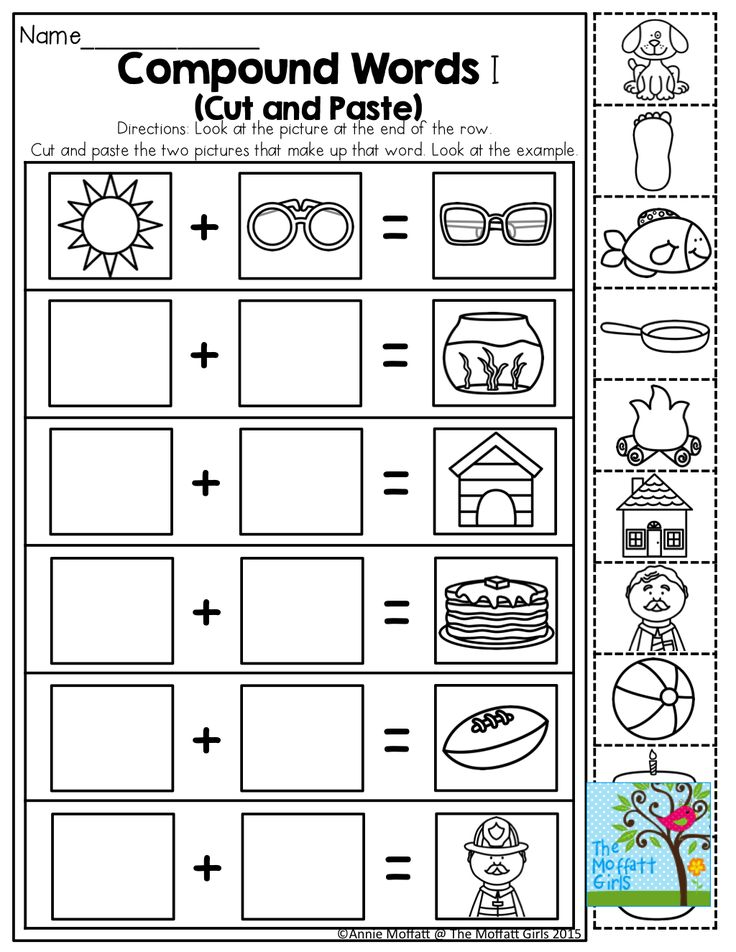 You can also provide references and compound word list examples.
You can also provide references and compound word list examples.
You can prepare a deck of single words printed onto cards and present them to your classroom. They need to match the correct pairs together to form a compound word. You can also do this activity with hyphenated words by giving them extra cards representing a dash.
6. Draw the compound wordThis gives your students a kinesthetic way of learning about compound words through painting. Your students can paint out the compound word based on the prompt shared with them. E.g., they can be given sun + screen, and they must draw a tube of sunscreen.
Related Reading: How Can Teachers Help English Language Learners
Frequently Asked Questions(FAQs)
Can you use flashcards to teach compound words ?
Yes, flashcards are an effective way to teach compound words to kids. You can print them out as a teaching tool when exploring complex compound words.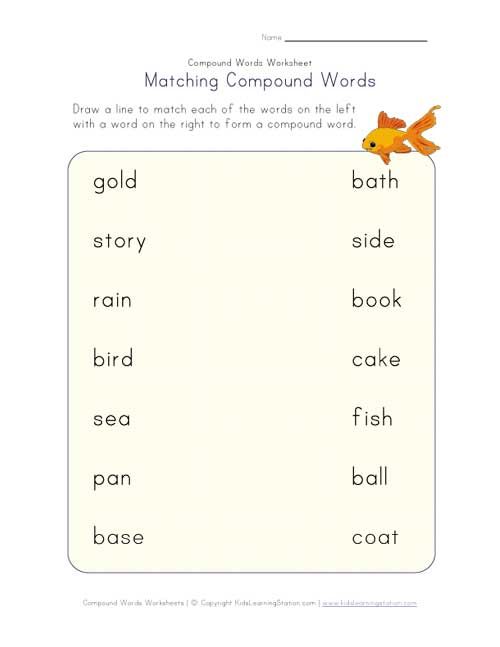
Why do kids need to learn compound words?
The etymology and utility of compound words are essential to teaching kids to make them more comfortable with speaking, understanding, writing, and listening to the English language.
How to introduce compound words to young kids?
You can introduce compound words to kids through multiple strategies, such as with toys, props, storytelling, and games.
Words for Kids Word Game: Fun Words List
tgames For children
What is a word game? For example, the 1st participant says "cow" ending in "A". So, the 2nd participant calls the word , starting with "A"; for example, "watermelon" and so on. For reflection - a few seconds, the losers are not determined here.
Compound words can be viewed here:
Words for word games for children under 5 years old
- Butterfly
- Orange
- Pencil
- Beetle
- Grapes
- Scissors
- Lion cub
- Ball
- Umbrella
- Duck
- Cheese
- Apple
- Clothing
- Mouse
- Cheese
- Flower
- Glasses
- Bread
- Flag
- Kettle
- Bird
- Brush
- Pole
- Cat
- Rooster
- Kefir
- Spatula
- Cube
- Apricot
- Boot
For children from 5 to 8 years old
- Raccoon
- Call
- Spruce
- Lemon
- Hammer
- Owl
- Trumpeter
- Chicken
- Yacht
- Bell
- Stump
- Cucumber
- Pumpkin
- Raisins
- Snowman
- Tiger
- Sorrel
- Bolt
- Lesson
- Glass
- Pump
- Chalk
- Turnip
- Bow
- Penguin
- Juggler
- Hacksaw
- Peanuts
- Month
- Cardboard
For older children
- Ballet
- Bell
- Chisel
- Badge
- Peanut
- Pod
- Suit
- Roller
- Shoulder strap
- Rhombus
- Lamp
- Switch
- Marker
- Cello
- Bagel
- Section
- Hair
- Strip
- Slice
- Receipt
- South
- Area
- Date
- Melody
- Package
- Post
- Rope
- Magnet
- Rafinade
- Nectar
Junior
- Screwdriver
- Yoga
- Degree
- Handle
- Attraction
- Skateboard
- Monopoly
- Repertoire
- Lever
- Sensor
- Teak
- Anime
- Loader
- Self-tapping screw
- Camera
- Lamp
- Scooter
- Barrenflower
- Sheepskin coat
- Sintepon
- Glaze
- Amethyst
- Tarragon
- Anchor
- Clarinet
- Catamaran
- Agate
- Bracelet
- Mercury
- Dome
Note: unpronounceable characters (b, b) at the end of a word are not considered; for example, the answer to the word "coal" will be a word with the letter L .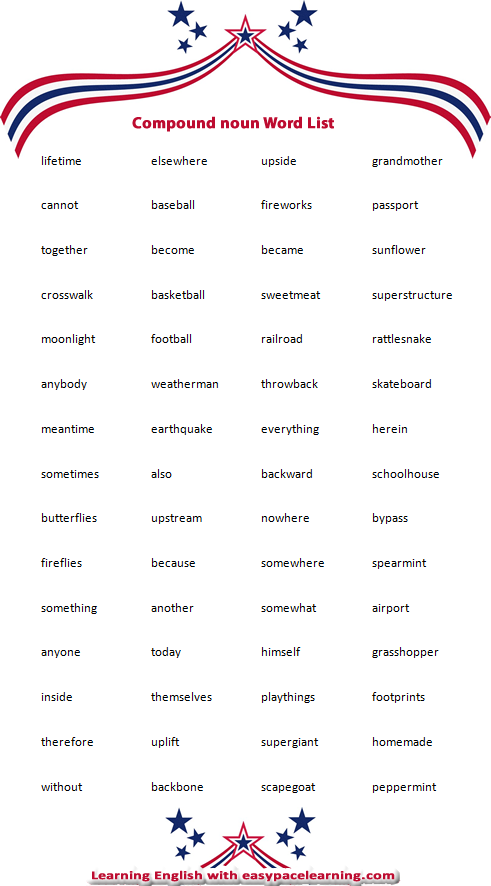 In turn, you can equate the letters E / E and Y / I - in games for preschoolers and elementary school students.
In turn, you can equate the letters E / E and Y / I - in games for preschoolers and elementary school students.
Words with two roots (compound words) with separating e, o. Word list.
Two or even three words can form a new word. This way of forming new words is called addition, and the words themselves are called complex. To understand where the roots are in a complex word, you must first correctly determine its meaning. For example, a steamboat is not one that sails in pairs, but a ship that sails in pairs. Or a mousetrap is not a dexterous mouse, but a mouse trap.
There are words that look like compounds, but in fact they have only one root, and it clearly emerges after finding the meaning of the word. For example, yellowish is not yellow wool, but slightly yellow, the root is one (yellow), and ovate is a suffix. Or the greatest is not a great tea, but just a very great one.
Let's work on the definition of words with two roots
Vacuum cleaner: A machine for removing dust by sucking it in with a jet of air.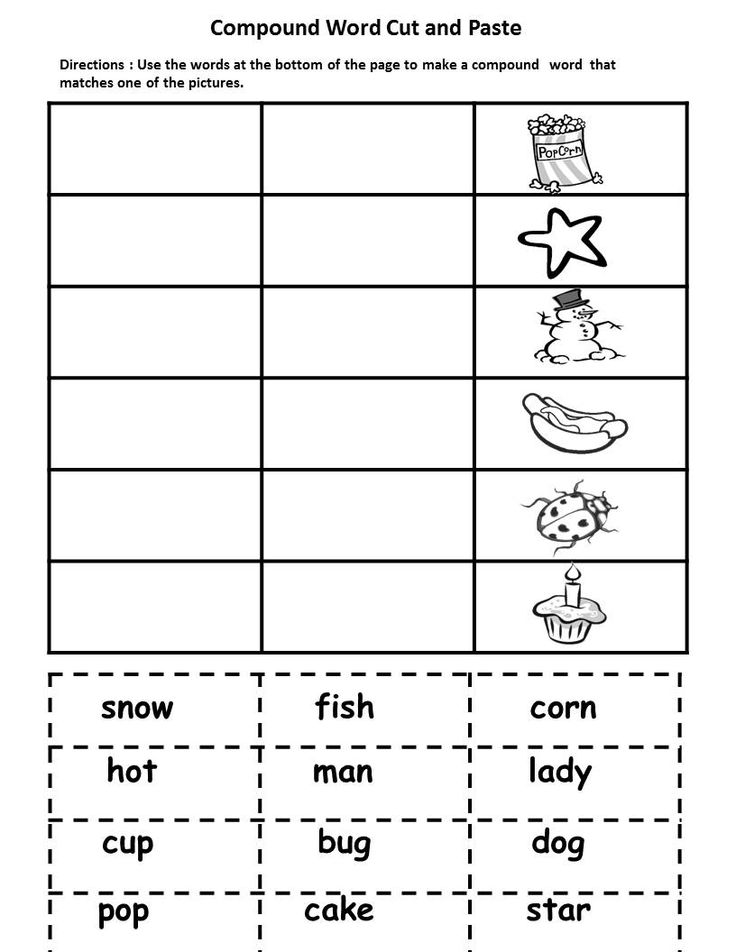
Rhinoceros: Large mammal of southern countries with one or two horns on the front of the muzzle.
Tipper: Truck with mechanical tipping body.
Scooter: At the beginning of the 20th century: the army name for a bicycle, a mechanical cart.
Scooter: Now: For children: a rolling bar with a standing handle on wheels or rollers.
Helicopter: A vertical take-off and landing heavier-than-air aircraft with a horizontal main propeller “propellers”.
Airplane: An aircraft heavier than air with a power plant and a wing that generates lift.
(Interpretation taken from Ozhegov's Explanatory Dictionary)
Otherwise, a vacuum cleaner is something that sucks dust. Roots ardor, sos.
Rhino is an animal with a horn on its nose. Nose roots, horn.
Dump truck - a machine that dumps the load itself. The roots itself and the shaft. C in front of the second root is a prefix.
A scooter is a device that rolls itself. Roots myself, cat.

